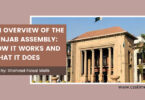By: Mehmil Khalid Kunwar
Without a strong check and balance and subsequent implementation, laws if made, have little chance of success
An enlightened citizen is a proof that a state is truly running on democratic lines. Democracy cannot flourish in a region where the inhabitants do not know the actual performance of the people they have elected or where they are denied their basic fundamental rights. According to the traditional concept of democracy, a citizen when elects his representative, is fully equipped with the right to ask the latter about fulfillment of his responsibilities and expects him to demonstrate a responsive character towards the demands of the masses.
This, not only promotes a culture of accountability, but also inculcates in the rulers, the fear of exercising their rights, by the ruled.
In the past twenty years, the global shift towards the free flow of information and the role of citizens in the functioning of government has swept the world. In order to maintain an effective discipline of strict implementation of policies and holding public officials accountable for their duties and functions, more and more countries are getting inclined to incorporate the legislation of access to information (RTI) in their legal frameworks. Among several states in Asia, Pakistan has also passed the right of access to information (RTI) Act in 2017 and currently has five RTI laws (one in federal and four in provinces).
It is pertinent to mention here that the Article 19-A of the Constitution under 18th Amendment also gives an inalienable right to the citizens of Pakistan to acquire information from public officials that makes it obligatory for the government to make arrangements for its sound implementation.
But, unfortunately, this has not been the case for several years. Besides the absence of strong willpower and poor governance, a host of other factors are responsible for undermining the effectiveness of this piece of legislation. Some of the discrepancies in its proper execution are aptly pointed out in a report “Measuring the implementation of access to information in Pakistan” published last year by a group of six NGOs involving some UNESCO representatives as well.
To name a few, the report shows that the practice of corruption in Pakistan has made institutions relatively inefficient making public officials enjoy impunity from the punishment in case of violation of the law.
It also states that there is an absolute absence of a body of Information Commission at federal and provincial level to support the foregoing law and its timely implementation. The report, while explaining the shortcomings, also highlights that there is a lack of answer to RTI requests being submitted to the public officials. The public officials especially those in bureaucracy, discourage people who seek information and do not show timely response to their requests due to which the hopes of citizens get dampened and eventually vanish altogether. Sadly, in some areas of Pakistan, people do not even know they are having this right to charge the people they have trusted with their affairs by making them accountable for their alleged delinquency.
The government, sometimes, for the sake of maintaining security regarding certain topics, deliberately withholds facts and misuses them to keep incriminating information secret.
Thus, the report, in its entirety, claims that freedom of expression and transparency has always been curtailed by the government in Pakistan or in severe cases, outrightly denied.
Now, it’s high time to reverse the current scenario and make a paradigm shift in the functioning of the government, ensuring across the board transparency and accountability and enhancing the serviceability of this law for the citizens. Here are a few suggestions:
First of all, there is a need to empower the citizens to know their basic rights and spreading awareness among them to exercise those rights (bearing pressure from all sides) in order to make the government accountable for its delayed response and intended targets. The role of journalists, civil society organisations and human rights activists is utmost essential here. If people know their rights properly, they can make it implemented rightly through force.
Secondly, appointment of a body of information commissioners in all ministries is very important. Pakistan can take the example of Sri Lanka in this case where a strong body of Information Commissioners (appointed through independent process) has solved the daily problems of Sri Lankans and have successfully facilitated over 2,000 RTI’s in the past.
Thirdly, to distinguish between what kind of information should be delivered to the citizens and what should be kept confidential, Transparency International proposes a standard test to be conducted to balance the public interest of disclosing or withholding the information so that the officials cannot act against the public interest in any manner. Refusal of any information must be justified on reasonable grounds.
Fourthly, public institutions should include more detailed information on their websites to help citizens get the required data as per their demands to secure responsiveness, hence acquiring good governance.
Most importantly, there is a need to arrange a capacity building session to raise awareness among officials response to RTI and its benefits (building trust of general public towards the institutions).
Right of Access to Information (RTI) is the bulwark of democracy and it ensures the participation of citizens in promoting good governance in a country and uprooting the various forms of corruption through powerful streams of transparency and accountability, if implemented in an effective manner. Without a strong check and balance and subsequent implementation, laws if made, have little chance of success.
Published in Nation, November 9th, 2020
Before you leave check our complete range of Essay for CSS/PMS
- Essay Outline: Electoral Reforms in Pakistan: Necessity and Challenges
- Health for All | Essay Outline for CSS PMS
- Exploring the Economic Potential of BRICS Countries: Opportunities and Challenges
- Art and Morality Essay Outline
- Instruction in Youth is Like Engraving in Stone | Complete Essay with Outline
- Public Office is a Public Trust | Complete CSS Essay
- Essay Outline “Good Governance is deeply rooted in Human Development”
- CSS Essay Outline | The Importance of Water Conservation and Management
- How to Write Effective Essay for CSS Exams
- How to Write Effective Essay on Economy? 7 Steps







